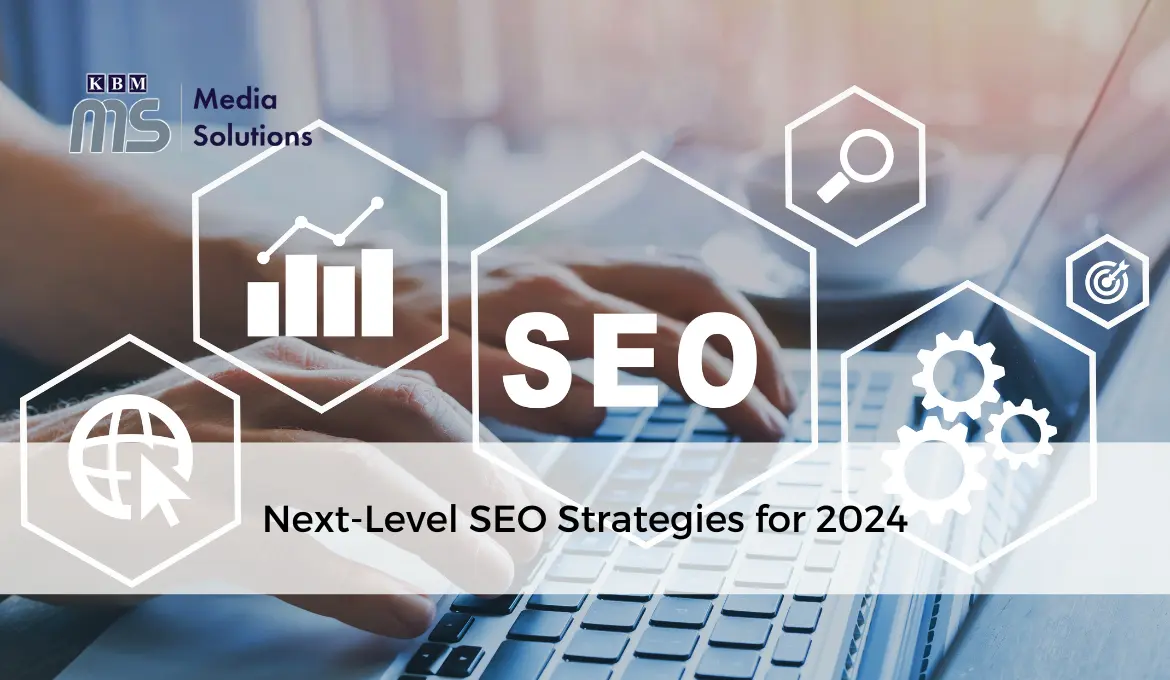Next-Level SEO Strategies for 2024

Posted on Jun 03, 2024
In the constantly changing digital marketing world, search engine optimisation (SEO) remains a cornerstone for driving organic traffic and enhancing online visibility. As search algorithms continue to evolve and consumer behaviour shifts, staying ahead of the curve requires adopting next-level SEO strategies that go beyond traditional tactics.
In this blog, we'll explore some of the cutting-edge SEO strategies poised to make an impact in 2024 and beyond.
AI-Powered Content Optimisation
Machine learning (ML) and artificial intelligence (AI) reshape how search engines create, optimise, and rank content. AI-powered solutions can examine vast amounts of data to identify content gaps, optimise on-page elements, and generate insights for creating highly relevant and engaging content.
By leveraging AI-driven content optimisation tools, marketers can develop content that engages with their target audience and meets the ever-changing requirements of search engine algorithms.
- Strategy: Invest in AI-powered content optimisation tools that analyse search trends, competitor performance, and user intent to inform your content strategy. Use AI-generated insights to optimise on-page elements such as title tags, meta descriptions, and headings and create high-quality content that solves the needs and interests of your target audience.
User Experience (UX) Optimisation
The user experience aspect has become a critical ranking factor for search engines, with algorithms emphasising page load speed, mobile responsiveness, and overall usability. Marketers focus on optimising the user experience across all touchpoints, from search engine results pages (SERPs) to website navigation and conversion paths.
By prioritising UX optimisations, brands can improve search rankings and enhance engagement and conversion rates.
- Strategy: Conduct comprehensive UX audits to identify areas for improvement on your website, including page load speed, mobile responsiveness, navigation structure, and content layout. Implement best practices for UX design, such as intuitive navigation, clear calls-to-action, and fast-loading pages, to provide visitors with a seamless and enjoyable experience.
Semantic Search and Natural Language Processing (NLP)
With the advent of semantic search and natural language processing (NLP) technologies, search engines can better understand the context and intent behind user queries.
Marketers leverage semantic SEO strategies to optimise their content for relevance and context, creating comprehensive, authoritative, and semantically rich content that addresses various related topics and concepts.
- Strategy: Conduct keyword research using semantic SEO tools to identify related topics, concepts, and entities relevant to your target audience. Create comprehensive and authoritative content that covers a wide range of related issues, using natural language and semantic markup to provide context and relevance to search engines.
Voice Search Optimisation
The increase of voice-enabled devices and virtual assistants has led to a rise in voice search queries, with consumers using natural language to search for information and answers to their questions.
Marketers are adapting their SEO strategies to optimise voice search, focusing on long-tail keywords, conversational content, and featured snippets that address common voice search queries.
- Strategy: Identify and target long-tail keywords and phrases that align with the conversational nature of voice search queries. Optimises your content for featured snippets by offering concise answers to common points and structuring your content in an easily digestible format by virtual assistants.
E-A-T (Expertise, Authoritativeness, Trustworthiness):
Google's E-A-T framework has become a guiding principle for SEO, emphasising the importance of expertise, authoritativeness, and trustworthiness in content creation and website optimisation.
Marketers are focusing on building trust and credibility with their audience by providing reliable, accurate, and authoritative content that demonstrates expertise in their field.
- Strategy: Create high-quality content that demonstrates your expertise and authority in your niche, backed by credible sources and references. Build trust with your audience by offering transparent and accurate information, engaging with user feedback and reviews, and demonstrating a commitment to ethical and responsible practices.
Local SEO and Hyperlocal Targeting
As consumers increasingly depend on search engines for local businesses and services, optimising local search has become essential for brick-and-mortar and service-based companies.
Marketers are leveraging local SEO strategies to optimise their online presence for hyperlocal searches, including optimising Google My Business profiles, local directory listings, and location-specific content.
- Strategy: Optimises your Google My Business profile with accurate business information, including your address, phone number, and business hours. Create location-specific content targeting hyperlocal keywords and topics, and engage with local community events and organisations to build local authority and relevance.
Conclusion
As search engine algorithms constantly evolve and consumer behaviour shifts, mastering the next-level SEO is essential for driving organic traffic and increasing online visibility.
By leveraging AI-powered content optimisation, prioritising user experience, and focusing on semantic search, voice search, and E-A-T principles, marketers can stay ahead of the curve and achieve sustainable results in the competitive digital marketing landscape.
With a strategic method and a commitment to continuous improvement, brands can unlock SEO's full potential as a powerful tool for driving business growth and success in 2024 and beyond.